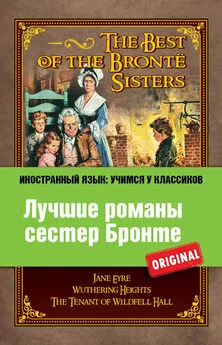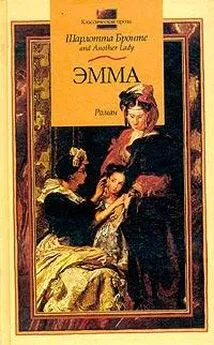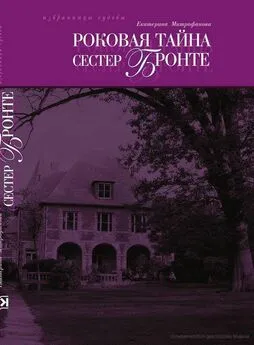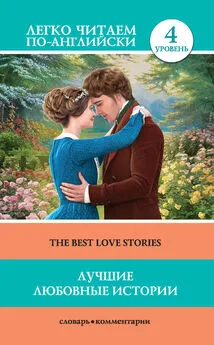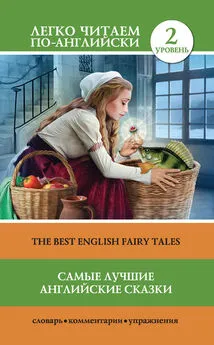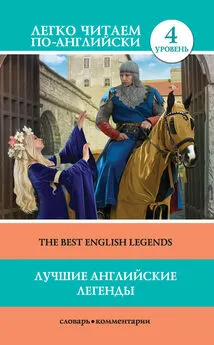Шарлотта Бронте - Лучшие романы сестер Бронте / The best of the Brontë sisters
- Название:Лучшие романы сестер Бронте / The best of the Brontë sisters
- Автор:
- Жанр:
- Издательство:Литагент «Эксмо»334eb225-f845-102a-9d2a-1f07c3bd69d8
- Год:2013
- Город:Москва
- ISBN:978-5-699-61892-7
- Рейтинг:
- Избранное:Добавить в избранное
-
Отзывы:
-
Ваша оценка:
Шарлотта Бронте - Лучшие романы сестер Бронте / The best of the Brontë sisters краткое содержание
«Иностранный язык: учимся у классиков» – это только оригинальные тексты лучших произведений мировой литературы. Эти книги станут эффективным и увлекательным пособием для изучающих иностранный язык на хорошем «продолжающем» и «продвинутом» уровне. Они помогут эффективно расширить словарный запас, подскажут, где и как правильно употреблять устойчивые выражения и грамматические конструкции, просто подарят радость от чтения. В конце книги дана краткая информация о культуроведческих, страноведческих, исторических и географических реалиях описываемого периода, которая поможет лучше ориентироваться в тексте произведения.
Серия «Иностранный язык: учимся у классиков» адресована широкому кругу читателей, хорошо владеющих английским языком и стремящихся к его совершенствованию.
Лучшие романы сестер Бронте / The best of the Brontë sisters - читать онлайн бесплатно ознакомительный отрывок
Интервал:
Закладка:
It is hard that my little darling should love him more than me; and that, when the well-being and culture of my son is all I have to live for, I should see my influence destroyed by one whose selfish affection is more injurious than the coldest indifference or the harshest tyranny could be. If I, for his good, deny him some trifling indulgence, he goes to his father, and the latter, in spite of his selfish indolence, will even give himself some trouble to meet the child’s desires: if I attempt to curb his will, or look gravely on him for some act of childish disobedience, he knows his other parent will smile and take his part against me. Thus, not only have I the father’s spirit in the son to contend against, the germs of his evil tendencies to search out and eradicate, and his corrupting intercourse and example in after-life to counteract, but already he counteracts my arduous labour for the child’s advantage, destroys my influence over his tender mind, and robs me of his very love; I had no earthly hope but this, and he seems to take a diabolical delight in tearing it away.
But it is wrong to despair; I will remember the counsel of the inspired writer to him ‘that feareth the Lord and obeyeth the voice of his servant, that sitteth in darkness and hath no light; let him trust in the name of the Lord, and stay upon his God!’
Chapter XXXVII
December 20th, 1825. – Another year is past; and I am weary of this life. And yet I cannot wish to leave it: whatever afflictions assail me here, I cannot wish to go and leave my darling in this dark and wicked world alone, without a friend to guide him through its weary mazes, to warn him of its thousand snares, and guard him from the perils that beset him on every hand. I am not well fitted to be his only companion, I know; but there is no other to supply my place. I am too grave to minister to his amusements and enter into his infantile sports as a nurse or a mother ought to do, and often his bursts of gleeful merriment trouble and alarm me; I see in them his father’s spirit and temperament, and I tremble for the consequences; and too often damp the innocent mirth I ought to share. That father, on the contrary, has no weight of sadness on his mind; is troubled with no fears, no scruples concerning his son’s future welfare; and at evenings especially, the times when the child sees him the most and the oftenest, he is always particularly jocund and open-hearted: ready to laugh and to jest with anything or anybody but me, and I am particularly silent and sad: therefore, of course, the child dotes upon his seemingly joyous amusing, ever-indulgent papa, and will at any time gladly exchange my company for his. This disturbs me greatly; not so much for the sake of my son’s affection (though I do prize that highly, and though I feel it is my right, and know I have done much to earn it) as for that influence over him which, for his own advantage, I would strive to purchase and retain, and which for very spite his father delights to rob me of, and, from motives of mere idle egotism, is pleased to win to himself; making no use of it but to torment me and ruin the child. My only consolation is, that he spends comparatively little of his time at home, and, during the months he passes in London or elsewhere, I have a chance of recovering the ground I had lost, and overcoming with good the evil he has wrought by his wilful mismanagement. But then it is a bitter trial to behold him, on his return, doing his utmost to subvert my labours and transform my innocent, affectionate, tractable darling into a selfish, disobedient, and mischievous boy; thereby preparing the soil for those vices he has so successfully cultivated in his own perverted nature.
Happily, there were none of Arthur’s ‘friends’ invited to Grassdale last autumn: he took himself off to visit some of them instead. I wish he would always do so, and I wish his friends were numerous and loving enough to keep him amongst them all the year round. Mr. Hargrave, considerably to my annoyance, did not go with him; but I think I have done with that gentleman at last.
For seven or eight months he behaved so remarkably well, and managed so skilfully too, that I was almost completely off my guard, and was really beginning to look upon him as a friend, and even to treat him as such, with certain prudent restrictions (which I deemed scarcely necessary); when, presuming upon my unsuspecting kindness, he thought he might venture to overstep the bounds of decent moderation and propriety that had so long restrained him. It was on a pleasant evening at the close of May: I was wandering in the park, and he, on seeing me there as he rode past, made bold to enter and approach me, dismounting and leaving his horse at the gate. This was the first time he had ventured to come within its inclosure since I had been left alone, without the sanction of his mother’s or sister’s company, or at least the excuse of a message from them. But he managed to appear so calm and easy, so respectful and self-possessed in his friendliness, that, though a little surprised, I was neither alarmed nor offended at the unusual liberty, and he walked with me under the ash-trees and by the water-side, and talked, with considerable animation, good taste, and intelligence, on many subjects, before I began to think about getting rid of him. Then, after a pause, during which we both stood gazing on the calm, blue water – I revolving in my mind the best means of politely dismissing my companion, he, no doubt, pondering other matters equally alien to the sweet sights and sounds that alone were present to his senses, – he suddenly electrified me by beginning, in a peculiar tone, low, soft, but perfectly distinct, to pour forth the most unequivocal expressions of earnest and passionate love; pleading his cause with all the bold yet artful eloquence he could summon to his aid. But I cut short his appeal, and repulsed him so determinately, so decidedly, and with such a mixture of scornful indignation, tempered with cool, dispassionate sorrow and pity for his benighted mind, that he withdrew, astonished, mortified, and discomforted; and, a few days after, I heard that he had departed for London. He returned, however, in eight or nine weeks, and did not entirely keep aloof from me, but comported himself in so remarkable a manner that his quick-sighted sister could not fail to notice the change.
‘What have you done to Walter, Mrs. Huntingdon?’ said she one morning, when I had called at the Grove, and he had just left the room after exchanging a few words of the coldest civility. ‘He has been so extremely ceremonious and stately of late, I can’t imagine what it is all about, unless you have desperately offended him. Tell me what it is, that I may be your mediator, and make you friends again.’
‘I have done nothing willingly to offend him,’ said I. ‘If he is offended, he can best tell you himself what it is about.’
‘I’ll ask him,’ cried the giddy girl, springing up and putting her head out of the window: ‘he’s only in the garden – Walter!’
‘No, no, Esther! you will seriously displease me if you do; and I shall leave you immediately, and not come again for months – perhaps years.’
‘Did you call, Esther?’ said her brother, approaching the window from without.
‘Yes; I wanted to ask you – ’
‘Good-morning, Esther,’ said I, taking her hand and giving it a severe squeeze.
‘To ask you,’ continued she, ‘to get me a rose for Mrs. Huntingdon.’ He departed. ‘Mrs. Huntingdon,’ she exclaimed, turning to me and still holding me fast by the hand, ‘I’m quite shocked at you – you’re just as angry, and distant, and cold as he is: and I’m determined you shall be as good friends as ever before you go.’
‘Esther, how can you be so rude!’ cried Mrs. Hargrave, who was seated gravely knitting in her easy-chair. ‘Surely, you never will learn to conduct yourself like a lady!’
‘Well, mamma, you said yourself – ’ But the young lady was silenced by the uplifted finger of her mamma, accompanied with a very stern shake of the head.
‘Isn’t she cross?’ whispered she to me; but, before I could add my share of reproof, Mr. Hargrave reappeared at the window with a beautiful moss-rose in his hand.
‘Here, Esther, I’ve brought you the rose,’ said he, extending it towards her.
‘Give it her yourself, you blockhead!’ cried she, recoiling with a spring from between us.
‘Mrs. Huntingdon would rather receive it from you,’ replied he, in a very serious tone, but lowering his voice that his mother might not hear. His sister took the rose and gave it to me.
‘My brother’s compliments, Mrs. Huntingdon, and he hopes you and he will come to a better understanding by-and-by. Will that do, Walter?’ added the saucy girl, turning to him and putting her arm round his neck, as he stood leaning upon the sill of the window – ‘or should I have said that you are sorry you were so touchy? or that you hope she will pardon your offence?’
‘You silly girl! you don’t know what you are talking about,’ replied he gravely.
‘Indeed I don’t: for I’m quite in the dark!’
‘Now, Esther,’ interposed Mrs. Hargrave, who, if equally benighted on the subject of our estrangement, saw at least that her daughter was behaving very improperly, ‘I must insist upon your leaving the room!’
‘Pray don’t, Mrs. Hargrave, for I’m going to leave it myself,’ said I, and immediately made my adieux.
About a week after Mr. Hargrave brought his sister to see me. He conducted himself, at first, with his usual cold, distant, half-stately, half-melancholy, altogether injured air; but Esther made no remark upon it this time: she had evidently been schooled into better manners. She talked to me, and laughed and romped with little Arthur, her loved and loving playmate. He, somewhat to my discomfort, enticed her from the room to have a run in the hall, and thence into the garden. I got up to stir the fire. Mr. Hargrave asked if I felt cold, and shut the door – a very unseasonable piece of officiousness, for I had meditated following the noisy playfellows if they did not speedily return. He then took the liberty of walking up to the fire himself, and asking me if I were aware that Mr. Huntingdon was now at the seat of Lord Lowborough, and likely to continue there some time.
‘No; but it’s no matter,’ I answered carelessly; and if my cheek glowed like fire, it was rather at the question than the information it conveyed.
‘You don’t object to it?’ he said.
‘Not at all, if Lord Lowborough likes his company.’
‘You have no love left for him, then?’
‘Not the least.’
‘I knew that – I knew you were too high-minded and pure in your own nature to continue to regard one so utterly false and polluted with any feelings but those of indignation and scornful abhorrence!’
‘Is he not your friend?’ said I, turning my eyes from the fire to his face, with perhaps a slight touch of those feelings he assigned to another.
‘He was,’ replied he, with the same calm gravity as before; ‘but do not wrong me by supposing that I could continue my friendship and esteem to a man who could so infamously, so impiously forsake and injure one so transcendently – well, I won’t speak of it. But tell me, do you never think of revenge?’
‘Revenge! No – what good would that do? – it would make him no better, and me no happier.’
‘I don’t know how to talk to you, Mrs. Huntingdon,’ said he, smiling; ‘you are only half a woman – your nature must be half human, half angelic. Such goodness overawes me; I don’t know what to make of it.’
Читать дальшеИнтервал:
Закладка:
